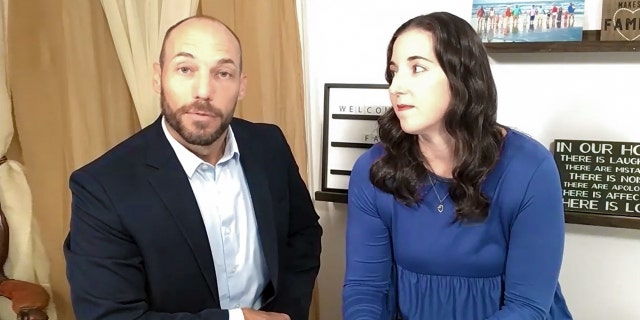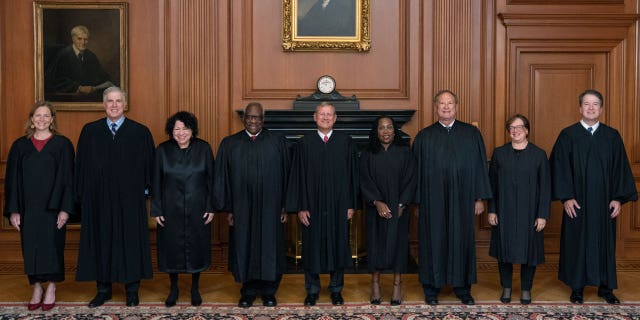Chad and Jennifer Brackeen virtually had their Native American adopted son taken away from them due to a federal law that codifies what their attorneys say is “racial discrimination.” Now, the family is combating to keep custody of his half-sister by way of a Supreme Court case that might intestine a significant a part of that law however which Native tribes warn might strike a far-reaching blow to their sovereignty.
The case, Haaland v. Brackeen, combines instances from a handful of different households and a number of states, together with Texas, the place the Brackeens dwell. At the middle of the controversy is the Indian Child Welfare Act (ICWA), a Seventies law meant to defend Native American youngsters in state child custody proceedings.
The law was a response to excessive charges of Native youngsters being adopted by non-tribal members – usually with little course of and unjustly. It prioritizes inserting Native youngsters with prolonged family members, members of their tribe, and if that’s not doable, with one other Native family. Exceptions for “good cause” are allowed however not particularly outlined.
“Congress’s racial discrimination is ‘most evident’ in ICWA’s third placement preference … which bluntly favors any ‘Indian famil[y]’ from any of 574 tribes over any non-Indian family,” a short from the Brackeens’ attorneys says.
“The placement preferences ‘operate individually and jointly’ to disadvantage non-Indian parents seeking to adopt an Indian child,” reads the court docket submitting.
SUPREME COURT TAKING UP CASE FROM COLORADO ARTIST FOR RELIGIOUS LIBERTY


Chad and Jennifer Brackeen instructed Fox News Digital that they’re nervous their adopted daughter, Y.R.J., may very well be “ripped” from their family thanks to the Indian Child Welfare Act.
(Tyler Olson/Fox News Digital)
The Brackeens’ attorneys additionally argued that Congress overstepped its bounds by making an attempt to regulate state child custody proceedings.
The Brackeens started fostering their adopted son, referred to in court docket paperwork as A.L.M., in 2016, after his mom, a member of Navajo Nation, was unable to take care of him. Navajo Nation ultimately recognized A.L.M. as a member of its tribe greater than a 12 months later, in accordance to the Brackeens, and sought to place him with different tribal members who weren’t associated to him and lived in a special state.
“They had decided that we were not a suitable home for him. And so we decided to pursue adoption through the court system,” Jennifer Brackeen instructed Fox News Digital.
The family to whom the Navajo Nation wished to ship A.L.M. stepped again from the proceedings, and the Brackeens gained custody. But their adoption saga continued after A.L.M.’s mom gave start to his half-sister, often known as Y.R.J.
The organic mom supported placement with the Brackeens. But Navajo Nation sought to place Y.R.J., in accordance to the Brackeens’ attorneys, “in another state hundreds of miles away with either a great-aunt or an unrelated Navajo couple.”


The Supreme Court will hear the case Haaland v. Brackeen on Nov. 9, 2022. Several Native American tribes and a handful of states are additionally events within the case.
(Collection of the Supreme Court of the United States by way of Getty Images)
NJ LAWMAKERS RECONSTRUCT GUN CARRY LAWS AFTER SUPREME COURT RULING
That case remains to be in a state court docket in Texas. But the Brackeens’ attorneys say the results of their Supreme Court case, which stemmed from their struggle to keep A.L.M., will probably determine the results of Y.R.J.’s case and thus the way forward for their family.
“It’s been three and a half years in court, and we have not been able to finalize that adoption,” Chad Brackeen stated.
“Our children are young, our oldest is 13, the baby sister is 4 and a half. So, to some degree, only the oldest are fully aware of what we’re going through,” he added. “And it’s our responsibility to sort of shield our children at this point of the uncertainty, that she could ultimately be taken, ripped from our home and moved states away.”
The tribes, in the meantime, say the Brackeens’ argument that favoring placement with Native households is similar as racial discrimination ignores centuries of U.S. law treating the tribes as political entities, not racial teams. The tribes on the case, together with Cherokee Nation, Oneida Nation and the Morongo Band of Mission Indians, say this understanding is essential to “Congress’ unique obligation toward the Indians.”
“The precedent of the Supreme Court is that Indian tribes are political groups of people, they are not racial groups of people,” Chrissi Ross Nimmo, the deputy lawyer common of Cherokee Nation, instructed reporters Tuesday. “Tribes determine citizenship … just like countries.”


The Supreme Court subsequent month will hear a case that might have main ramifications for Native American sovereignty.
(AP Photo/J. Scott Applewhite, File)
CALIFORNIA TO VOTE ON CONSTITUTIONAL RIGHT TO ABORTION
If the Supreme Court have been to rule that ICWA’s provisions are racially discriminatory, Nimmo stated, it could convey into “question other areas of federal Indian law, and quite frankly, the modern day existence of Indian nations in our country.”
“Tribes are separate sovereigns, and the Constitution expressly authorizes Congress to legislate specifically for Indians,” a short from the tribes says. “Congress has thus passed statutes that legislate specifically for Indians — protecting their lands, regulating their trade, punishing crimes against them, managing their resources, and providing education, housing, and healthcare (sic).”
Kate Fort, the director for the Indian Law Clinic at Michigan State University, referred to as the case a “facial attack on tribal sovereignty.” She additionally stated it might “lead to a fundamental re-understanding of how Congress can or cannot pass laws for tribes.”
Fort stated different litigants suing over an alleged playing monopoly for Native Americans in Washington state are already mimicking the arguments getting used within the Brackeen case.
CLICK HERE TO GET THE FOX NEWS APP
Nimmo additionally stated that the tribes deal with hundreds of adoption and foster instances per 12 months underneath ICWA, virtually at all times with optimistic outcomes. Cases just like the Brackeens’, by which there is a important dispute over the place to place a child, symbolize only a “tiny fraction,” she stated.
The Brackeens, nevertheless, say they’re simply searching for the most effective curiosity of the youngsters whose care they’re entrusted with.
“Ultimately, these two siblings belong together,” Chad Brackeen stated. “We feel that a move at this point to break those bonds that have developed over time would be detrimental to her and ultimately be detrimental to our son.”
The case is about for oral argument earlier than the Supreme Court on Nov. 9.
story by The Texas Tribune Source link


